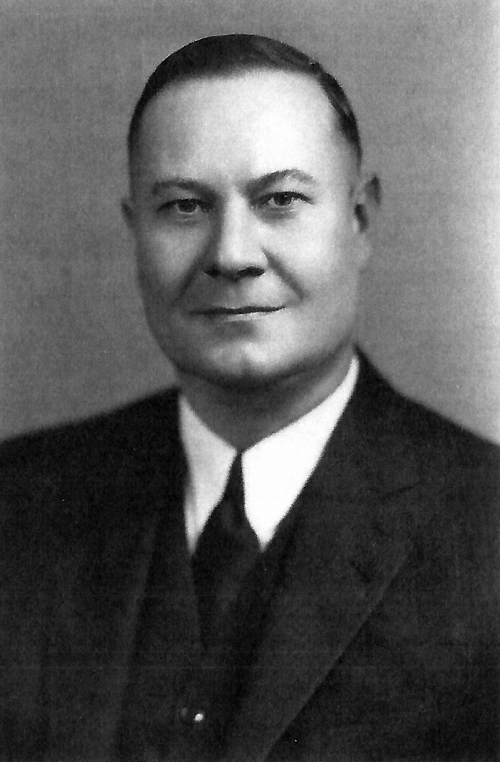Leland Hebbard Schenck (1956)
“A Big Man With A Big Heart”
by Jim McHenry
When Leland Schenck passed away on March 6, 1961, the Topeka Daily Capital praised him as “a big man with a big heart.” The editorial writer took note of his fondness for children, which extended beyond his four grandchildren to include those who received services from what was then called the Capper Foundation for Crippled Children.
Leland began his long association with Senator Arthur Capper during WWI, when he served as Capper’s personal secretary. Over time, he rose through the ranks to become vice president and secretary of Capper Publications, Inc. He knew of the senator’s life-long commitment to the Capper Foundation, and he had the honor of serving as the Foundation’s Board President. In that capacity, he presided over the ceremony dedicating the newly constructed facility on west Tenth Street. A photo taken at that time showed him holding the hand of a child as they walked toward the foundation’s new home base.
But that photo has an amazing back story that warrants sharing at this time of celebration. It could rightly be termed “A Kansas Profile in Courage.”
The story hinges off Section 8 of Senator Capper’s will, which specified that 25,000 shares of Capper Publications Inc. stock be transferred to the Capper Foundation for Crippled Children. This bequest was challenged by two board members, among them the president of Capper Publications, Inc., who argued that this provision should be set aside. They proposed instead that the shares in question should be made available for sale to interested employees, themselves included. They suggested the shares be valued at $10.00 per share. (Details of their case for setting the bequest aside are contained in the minutes of a special meeting of the board of directors of Capper Publications, Inc. held on May 9, 1956.)
Leland had a clear sense of why it was so important to follow Senator Capper’s will. He knew that both the present and future value of the shares would eclipse the value being offered by the set-asiders. He was joined in his opposition by W.A. Bailey. They also had the backing of the heirs of the late Henry S. Blake, who were termed a part of the stockholders’ faction.
When it became clear that sentiment was not trending their way, the set-aside faction decided to attempt an end run. They learned that Leland had been hospitalized for gall bladder surgery, and they decided to call a special meeting, assuming he would be indisposed and unable to cast his vote.
It was at this juncture that they badly misjudged their man. When Leland learned of their greedy, unethical plan, he requested a wheel chair be brought to his hospital room. Despite his doctors’ wishes, he knew his presence was urgently required. With the aid of a hospital volunteer, he was transferred to the meeting site.
In the face of significant physical pain and emotional stress, he was boldly wheeled into the board room. When asked by his grandson, James McHenry, Jr., how he was received he replied: “They looked like they had seen a ghost.” James remembers seeing a wry smile cross his face as he recalled that day of reckoning. The pressure tactics he had endured included harassing visits by one of the set-aside group’s attorneys. But he stood fast and would not be moved.
Leland’s courageous gesture set the stage for the set-asiders’ eventual defeat. A newspaper article in the Topeka State Journal on July 10, 1956, reports that Judge Glenn Cogswell denied a petition filed April 24 asking that the transfer order be set aside. The transfer order had been issued March 2, 1953. The Court ruled that according to section 8 of the Capper will “the petitioners who protested the order were not interested parties.”
 Looking forward, the journalist’s summary pointed out that “the ruling was considered a victory for the stockholders’ faction that included heirs of the late Mr. Blake.” In addition to their own stock, those in this group “will now be able to vote the 25,000 shares of Foundation stock too and thus have control of the vast publishing empire.”
Looking forward, the journalist’s summary pointed out that “the ruling was considered a victory for the stockholders’ faction that included heirs of the late Mr. Blake.” In addition to their own stock, those in this group “will now be able to vote the 25,000 shares of Foundation stock too and thus have control of the vast publishing empire.”
Leland’s courage did not go unappreciated. In a letter dated September 9, 1958, P.N. Blake observed, “During the recent hassle—with your body wracked and weak from a severe operation, and with business troubles foundering down upon you, you set your sails…in the right direction, and kept your head, while others were obsessed with lust for power and greed.”
Sometimes life serves up circumstances that resemble a highwayman’s “Stand and deliver!” Leland’s courageous defense of key provisions in Senator Capper’s will stand as a reminder that the power of presence can be critical at the turning of the tide. His family loves him and honors his principled actions, grateful that he helped safeguard the Capper Foundation’s interests and the well-being of the families and special needs children it serves.

